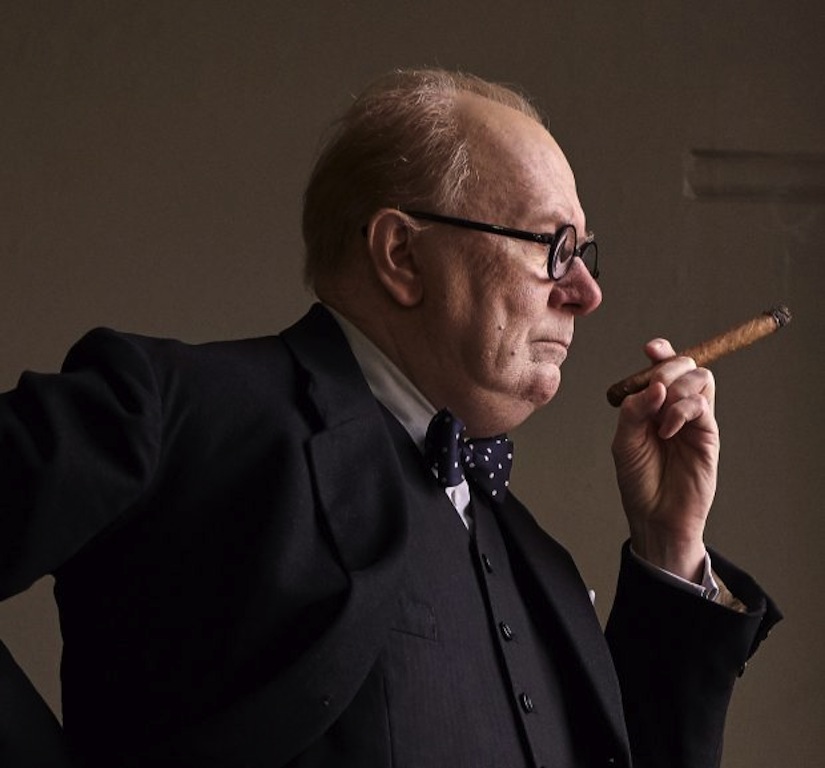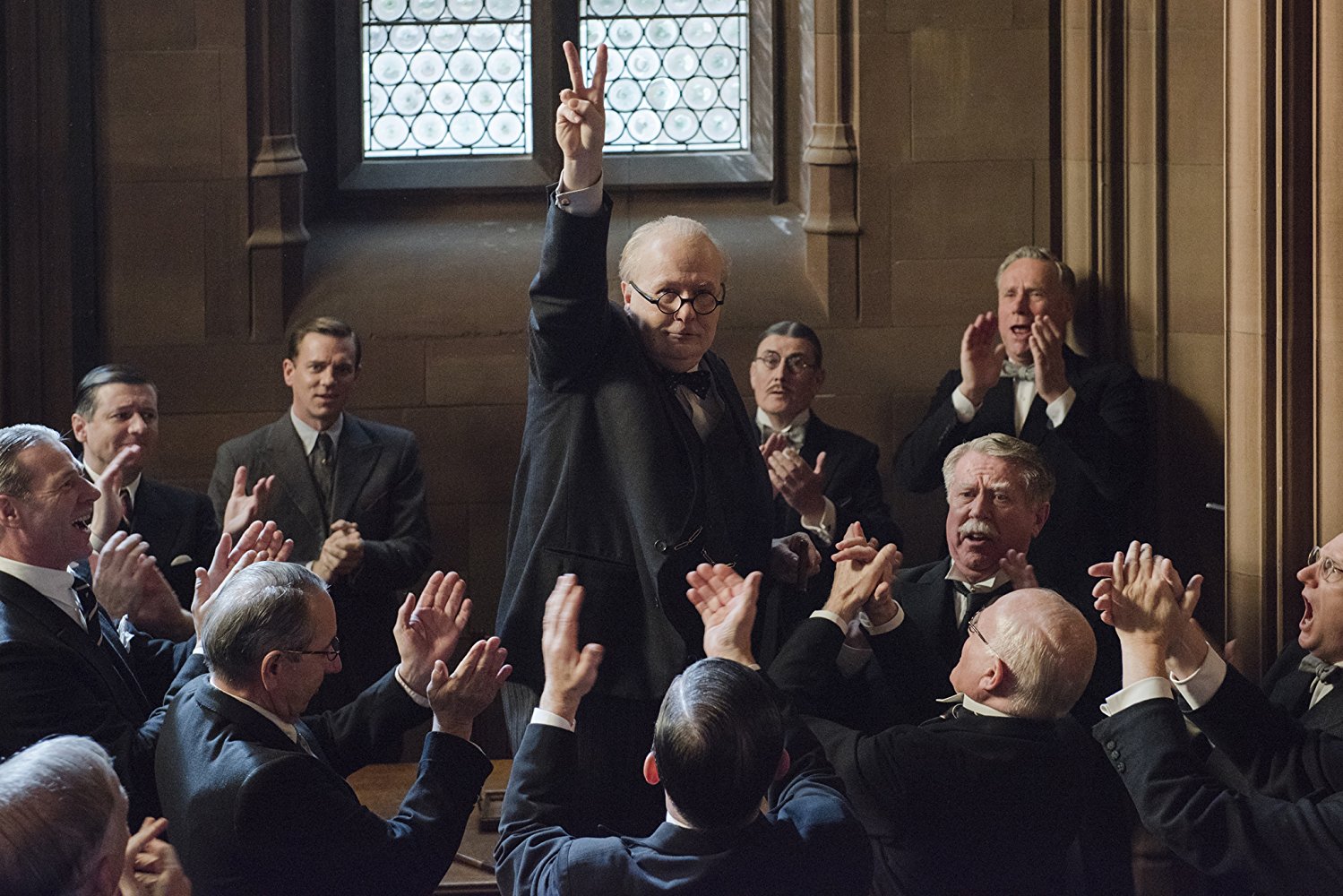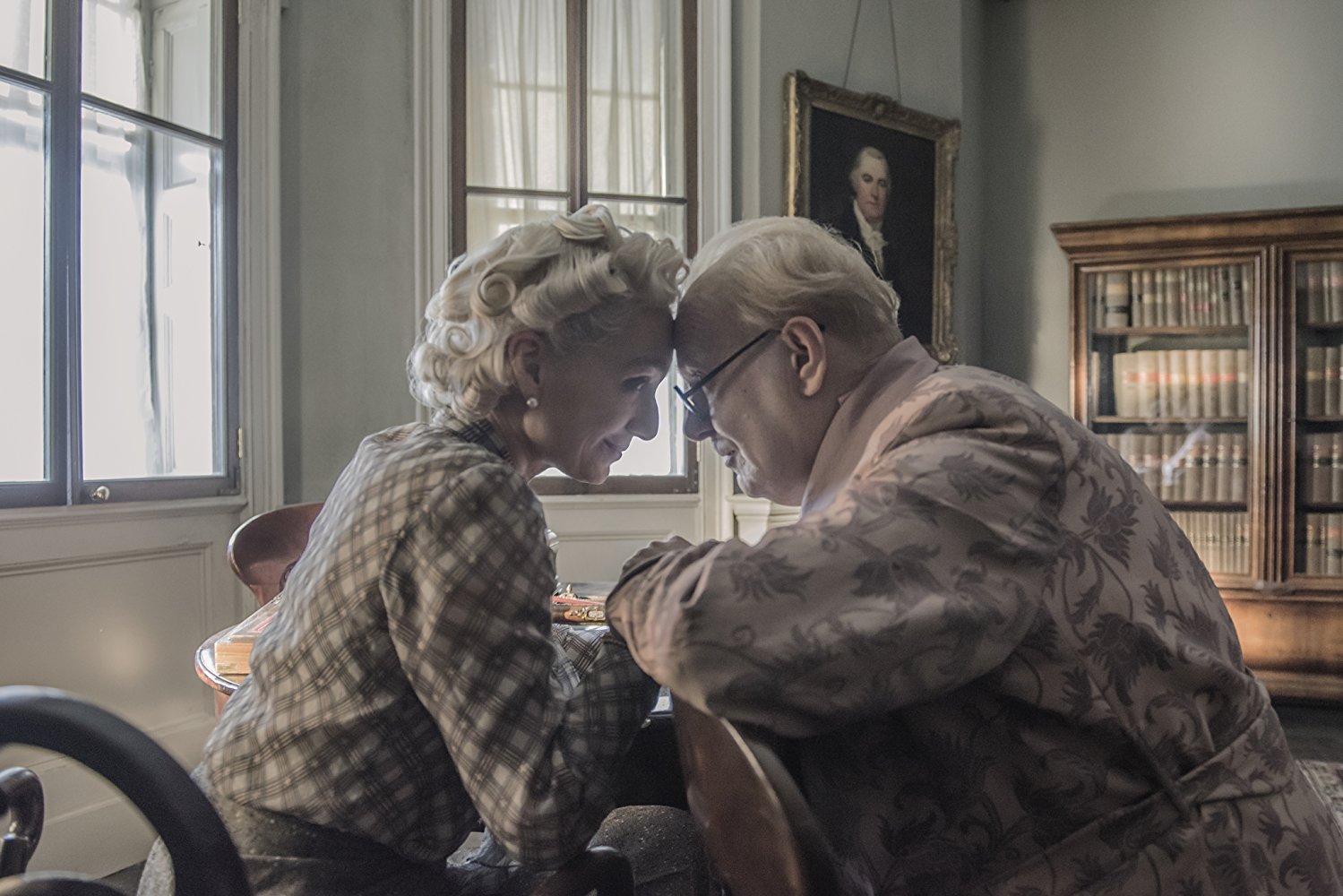By Pamela Zoslov
Darkest Hour chronicles the period following Winston Churchill's unlikely accession to UK Prime Minister in 1940 and his famous “We shall fight” radio address, a mere 48 hours later, stating that England would never compromise with or surrender to Hitler. The film was scripted by Anthony McCarten (who also wrote The Theory of Everything), for whom this episode in British history is a personal passion. The screenplay is adapted from a book McCarten wrote on the subject.
Gary Oldman, who is nearly as protean as Lon Chaney, is the umpteenth actor to portray “The British Bulldog.” Encased in masses of jowly makeup, Oldman persuasively affects Churchill's personality and mannerisms, or at least the way those are remembered through the unreliable prism of history. All that is recognizably Oldman are his eyes, which seem younger, and probably less bleary, than those of the prodigious drinker Churchill. (His daily alcohol intake was reportedly white wine with breakfast, champagne and brandy with lunch, two or three glasses of whiskey and soda in the afternoon, champagne and brandy with dinner, followed by more whiskey and soda.)

Oldman as the British Bulldog.
We should mention that Churchill's oratorical skills, legendary in hindsight, were not so highly regarded by all during his lifetime. Churchill had a lateral lisp he worked hard to overcome (dentures finally fixed it), and his winding Edwardian locutions (“Never in the field of human conflict...”) were considered old-fashioned in the '40s. Rather than being inspired by his militant rhetoric, many Britons were terrified, and skeptical of Churchill's exhortation to “fight on.”
A book by Richard Toye collected a sample of views of working-class English people at the time. Among Toye's claims:. “Many people thought he was drunk during his famous “finest hour” broadcast, and there is little evidence that [his speeches] made a decisive difference to the British people's will to fight on.” A Leeds shopkeeper complained, “Words, words, words and more words. I wish they would do something.” Churchill was widely mistrusted by many working-class people, who saw him as “a top-hatted, cigar-chewing toff,” according to Toye's book. Evelyn Waugh's 1942 novel Put Out More Flags satirizes this period before the war, contrasting the bumbling War Office, clueless aristocrats and greedy opportunists with the plight of the masses, who unlike the elites won't be evacuated from London when the German bombs fall.
 |
| Victory at all costs. |
Revisionist though it may be, Darkest Hour is a satisfying, well-paced drama with strong acting and beautiful design. The director, Joe Wright, can always be counted on for a gorgeously appointed period piece, and McCarten brings out the tension and drama of the gathering storm, with a good character details, as when Churchill speaks of his mother, the American-born socialite Jennie Jerome, and his negligent father, Lord Randolph Churchill. The senior Churchill was a bit of a monster. In 1893, he wrote a letter to Winston, an indifferent student who had been accepted, on his third try, to Sandhurst, the British army academy. "You will become a mere social wastrel, one of the hundreds of the public school failures, and you will degenerate into a shabby unhappy & futile existence. If this is so you will have to bear all the blame for such misfortunes yourself."
The cast is excellent, including Kirsten Scott Thomas as Churchill's doting wife, Clementine (“Clemmy”), far more intelligent than the actual Mrs. Churchill was said to be; Ronald Pickup as Neville Chamberlain (replacing John Hurt, who was dying); and Ben Mendelsohn as a particularly apt King George VI.
The film employs an “Upstairs, Downstairs” narrative that views Churchill through the eyes of a young secretary, Elizabeth Layton (Lily James) whom he at first browbeats, then comes to rely on. Miss Layton, gazing sadly at a framed photo of her brother, lost at Dunkirk, stands in for all of England's worried and grieving civilians. The Miss Layton character also allows Wright to indulge his odd predilection for typewriting, as he did in Atonement. The film's design makes a fetish of clacking keys, type and manuscripts. Miss Layton also provides a window into the more boorish elements of Churchill's behavior; in one scene she is made to take dictation just outside the door as the Prime Minister bathes, running off as the fat fellow emerges, naked (an unintentional Harvey Weinstein moment for the Prime Minister).
[

Darling Clementine: Kristen Scott Thomas and Oldman.[/caption]
With historical hindsight, of course, it seems absurd that anyone would endorse, as did Neville Chamberlain and the Foreign Secretary Viscount Hallifax (played by Stephen Dillane), a negotiated peace with Hitler, brokered by the then-neutral Mussolini. There were many, including the Times of London, who thought appeasement a reasonable solution, and in its dramatization of the War Cabinet Crisis, the film gives credible voice to the opposition's desire to avoid war, in light of the imminent fall of France and the encirclement of British forces at Dunkirk.
"Many of the advocates of appeasement saw themselves as practical thinkers," writes Thomas E. Ricks in his new book Churchill & Orwell. "In their view, they were faced with the fact that a rising Germany could be countered only by a strong European coalition willing to take military action. But, they noted, no such alliance was going to come together. So in their minds, given that lack of an alliance and in view of the slow pace of British rearmament, appeasement was the shrewd move, the favored course of heads much cooler than Winston Churchill's." He goes on to write, "...[I]t is clear now that appeasement rested more on self-delusion than on rational calculations, because it necessarily required faith in Hitler's sanity and trustworthiness."
Did Churchill really board the underground train before his cabinet speech and chat up passengers for their views on the war? I can't imagine, though it makes for an entertaining scene. The passengers, bricklayers, housewives and the like, are all for fighting the good fight, shouting “They'll never take Piccadilly!” Roaming in the aisle, Winston waves his cigar near an infant and remarks that “all babies look like me,” a common jape that certainly never fell from his lips.
In his speech to his Outer Cabinet, Churchill said, “If this long island story of ours is to end at last, let it end only when each one of us lies choking in his own blood upon the ground.” Britain must fight on against Hitler whatever the cost."
The cause was just, but the cost was high. Nearly half a million British people, military and civilian, lost their lives in World War II. And Churchill, having fulfilled his single-minded goal of defeating Hitler, was voted out of office in 1945, returning for another term from 1951-55.


No comments:
Post a Comment
We approve all legitimate comments. However, comments that include links to irrelevant commercial websites and/or websites dealing with illegal or inappropriate content will be marked as spam.
Note: Only a member of this blog may post a comment.